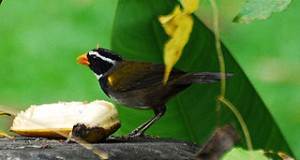Today I’d like to highlight an interesting new idea that could be of great benefit to parrots and parrot owners everywhere. A petition posted on the Causes.com website asks the Animal Planet Network to air shows concerning the potential problems involved in parrot ownership, with a view towards reaching people before they purchase a parrot. I was made aware of this important effort via George Sommer’s wonderful weekly column From the Parrot’s Beak. George’s updates, carried by the Boston Fish and Bird Examiner, are packed with husbandry tips, stories, links to conservation articles and much more –I heartily recommend signing up for his email mailing list.
Domestic vs. Tame
Despite thousands of years of close association with people, parrots are not domesticated animals. In many ways, their intelligence and speaking abilities are liabilities – uninformed folks may view them as even more “people-oriented” than are dogs or cats. This is especially so for those who have seen well-trained, affectionate parrots in action.
However, parrots remain wild creatures even after many generations in captivity, and the principals that apply to dog and cat care are of little use to parrot-keepers.
Unexpected Problems: Time and Money
Parrots are the USA’s third most-popular pet, but, unlike dog and cat care, parrot husbandry is not “common knowledge”. Most would be surprised to learn, for example, that parrots demand a far greater portion of their owner’s time than do dogs or cats.
I say this not referring to feeding and cleaning (although this too can be substantial), but as regards actual time spent interacting and working with the bird. Unless they are housed in large aviaries with other birds, parrots must have a great deal of human contact if they are to become good pets. Training, especially where problem behaviors are concerned, is often a far more difficult undertaking than is true for mammalian pets.
Avian medicine has come a long way in recent years, but much is still unknown and there are relatively few specialists. Consequently, veterinary care is usually more expensive than for cats and dogs.
Quality Information Needed
While “impulse buying” is generally limited to less expensive species such as Budgerigars and Cockatiels, it seems that many first-time parrot owners, even if they seek advice, are poorly informed as to the challenges they may face.
Parrot rescue centers and zoos (I cannot begin to count the number of calls I took from frustrated parrot owners during my years at the Bronx Zoo) are overflowing with unwanted birds. In some cases, unscrupulous “rescuers” re-sell such parrots without proper warnings, fueling the problem (please see article below).
The petition mentioned above seeks to convince Animal Planet to become involved in this issue by airing parrot-owner education shows. Considering the huge audiences that seem drawn to the network, I believe this to be an excellent idea. Anything we can do to dissuade those unprepared for parrot ownership will be of benefit not only to individual birds, but to various species as a whole…the taking of wild birds is still a serious problem in West Africa and elsewhere (please see article below).
You can learn more about becoming involved, view videos and read others’ opinions on the Causes.com website.
Further Reading
The Dark Side of parrot Rescues
 That Bird Blog – Bird Care and History for Pet Birds
That Bird Blog – Bird Care and History for Pet Birds




One comment
Pingback: Educational TV for Prospective Parrot Owners ? a Petition to Animal Planet | sidneysaade